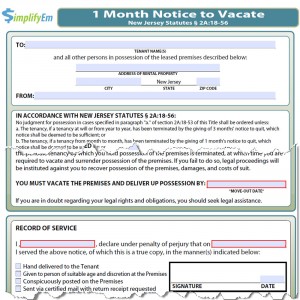New Jersey Notice to Vacate
New Jersey Notice to Vacate - What is it?New Jersey Notice to Vacate Forms are used by landlords and tenants in New Jersey to notify the other party that they do not intend to renew their rental agreement. This New Jersey Notice to Vacate Form notifies tenants to vacate the rental property, remove their possessions and return the keys by the expiration of the term. Many New Jersey property management companies also ask their tenants to provide a Notice to Vacate at least 30, 60, or 90 days before the lease has expired if they plan to move out at the end of the term. |
|||
|
|||
New Jersey Notice to Vacate - Why is it important?The New Jersey Notice to Vacate Form is an easy way to end your New Jersey rental lease. Landlords or tenants in New Jersey can use this form to communicate the date by which the rental property should be empty. For month-to-month leases (see the New Jersey rental agreement for tenancies at will) most states will require at least a 30 Day Notice to Vacate. The New Jersey Notice to Vacate could be given in the form of a 30 Day Notice to Vacate, 60 Day Notice to Vacate, or a 90 Day Notice to Vacate, depending on the circumstances. The notice period required is typically defined in the rental lease terms.
New Jersey Notice to Vacate - When should it be used?Many property managers use property management software to stay on top of rent collections and notice periods. A landlord or property manager in New Jersey can use the New Jersey Landlord Notice to Vacate Form when they want a tenant to vacate the rental property at the end of their lease (or leave in 30 days or more if there is no lease). Tenants can use the New Jersey Tenant Notice to Vacate Form to inform landlords and property managers of their intention to vacate the rental property at least 30 days before they intend to move out, or longer if required by the terms of their New Jersey Lease Agreement. There are a several other situations in which the New Jersey Notice to Vacate might be used, like if the rental property has been sold or if the building has been condemned.
New Jersey Notice to Vacate - What should be included?The New Jersey Notice to Vacate Form must contain the date on which the Notice to Vacate is given, and the time frame in which the rental property should become vacant. Specific details must be clearly stated on the notice, so the other party has reasonable awareness about their responsibilities. Here are some of the basic details that should be included in a New Jersey Notice to Vacate:
New Jersey Notice to Vacate - What should I do with it?If you are a tenant who has received the New Jersey Landlord Notice to Vacate, you may need to remove all of your possessions and vacate the rental property by the date stated on the Notice to Vacate Form. If you are a landlord or property manager who has received the New Jersey Tenant Notice to Vacate, you should start finding a new tenant for your rental property. If a Notice to Vacate is given before a tenant's New Jersey Lease Agreement has ended, additional actions may need to be taken by either party depending on the terms of the New Jersey rental agreement. New Jersey Notice to Vacate - What else should I know?The New Jersey Notice to Vacate is similar to the New Jersey Notice to Quit for termination of tenancy, and can be used to inform the tenant to leave after the lease is up (common with month to month leases in New Jersey), or if there is no lease and you just want the tenant to leave. The New Jersey Notice to Vacate does not evict the tenant or terminate the New Jersey Lease Agreement. If you want the tenant to vacate the property due to nonpayment of rent, or because they cause physical injury to the property or pose a health hazard, you should read more about New Jersey eviction notice forms like the notice to quit. The New Jersey Lease Termination Form might be more appropriate in other scenarios when there are other breaches in contract or if you need to void the New Jersey lease contract. It is important that these forms are detailed and specific, because an inaccurate or incomplete form could potentially cause difficulties during a future eviction proceeding.
|
|||





